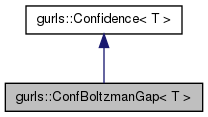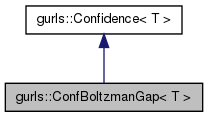 |
GURLS++
2.0.00
C++ Implementation of GURLS Matlab Toolbox
|
 |
GURLS++
2.0.00
C++ Implementation of GURLS Matlab Toolbox
|
ConfBoltzmanGap is the sub-class of Confidence that computes a confidence estimation for the predicted class (i.e. More...
#include <boltzmangap.h>


Public Member Functions | |
| GurlsOptionsList * | execute (const gMat2D< T > &X, const gMat2D< T > &Y, const GurlsOptionsList &opt) throw (gException) |
| Computes a confidence estimation for the predicted class (i.e. | |
Static Public Member Functions | |
| static Confidence< T > * | factory (const std::string &id) throw (BadConfidenceCreation) |
| Factory function returning a pointer to the newly created object. | |
highest scoring class).
Definition at line 58 of file boltzmangap.h.
| GurlsOptionsList * gurls::ConfBoltzmanGap< T >::execute | ( | const gMat2D< T > & | X, |
| const gMat2D< T > & | Y, | ||
| const GurlsOptionsList & | opt | ||
| ) | throw (gException) [virtual] |
highest scoring class). The scores are converted in probabilities using the Boltzman distribution and the difference between the highest scoring class and the second highest scoring class is used as an estimate.
| X | not used |
| Y | not used |
| opt | options with the following:
|
Implements gurls::Confidence< T >.
Definition at line 77 of file boltzmangap.h.
{
// [n,k] = size(opt.pred);
const gMat2D<T> &pred = opt.getOptValue<OptMatrix<gMat2D<T> > >("pred");
const unsigned long n = pred.rows();
const unsigned long t = pred.cols();
// out.confidence = opt.pred;
// out.confidence = exp(out.confidence);
// out.confidence = out.confidence./(sum(out.confidence,2)*ones(1,k));
// out.confidence = sort(out.confidence,2,'descend');
// out.confidence = out.confidence(:,1) - out.confidence(:,2);
const T* expscores = pred.getData();
T sum;
T* rowT = new T[t];
gMat2D<T> *conf = new gMat2D<T>(n,1);
T* confidence = conf->getData();
//TODO optmize search of two maxes
for(unsigned long i=0; i<n; ++i)
{
getRow(expscores, n, t, i, rowT);
exp(rowT, t);
sum = sumv(rowT, t);
scal(t, (T)(1.0/sum), rowT, 1);
std::sort(rowT,rowT+t);
confidence[i] = rowT[t-1]-rowT[t-2];
}
delete [] rowT;
GurlsOptionsList* ret = new GurlsOptionsList("confidence");
ret->addOpt("confidence", new OptMatrix<gMat2D<T> >(*conf));
return ret;
}
| static Confidence<T>* gurls::Confidence< T >::factory | ( | const std::string & | id | ) | throw (BadConfidenceCreation) [inline, static, inherited] |
Definition at line 105 of file confidence.h.
{
if(id == "boltzman")
return new ConfBoltzman<T>;
if(id == "boltzmangap")
return new ConfBoltzmanGap<T>;
if(id == "gap")
return new ConfGap<T>;
if(id == "maxscore")
return new ConfMaxScore<T>;
throw BadConfidenceCreation(id);
}